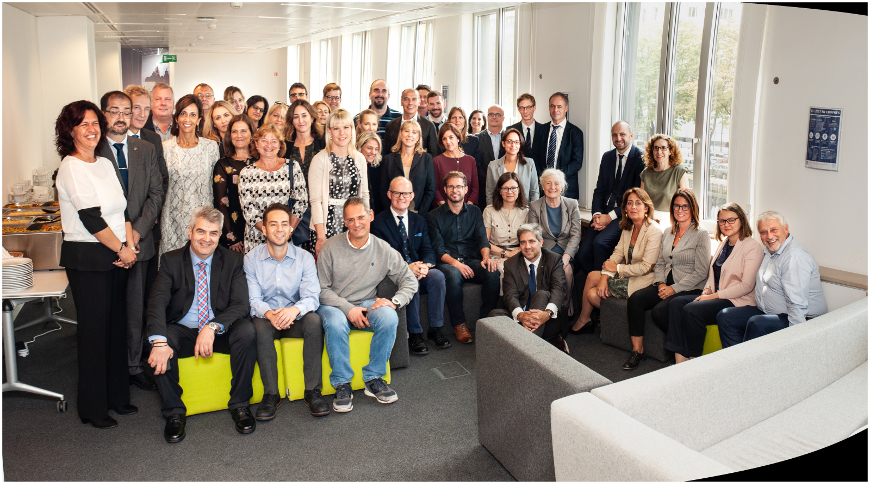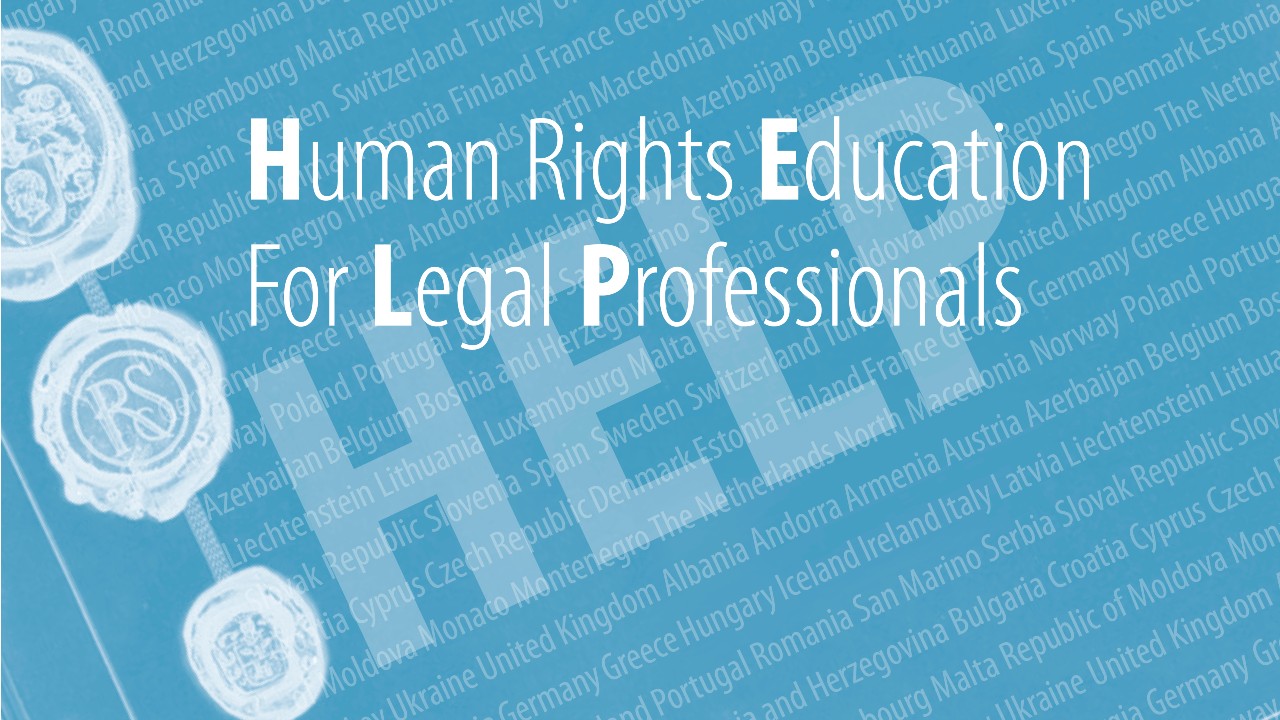A Seminar focusing on Radicalisation Prevention was organised on 20-21 September 2018 in collaboration with the Belgian Judicial Training Institute (IFJ/IGO), gathering over 50 participants from more than 15 countries and covering several professional categories such as judges, prosecutors, prison and probation officers as well as academics and members of international associations and NGOs.
The Seminar is the second of a series of three to be organised under the European Union-Council of Europe HELP Radicalisation Prevention Project, which is funded by the EU and implemented by the Council of Europe. The Project aims at improving the criminal justice response in the EU to prevent radicalisation leading to terrorism and violent extremism by increasing the capacities and mutual trust of justice practitioners (judges and prosecutors as well as prison and probation staff) dealing with radicalisation prevention through training, inter-agency and cross-border cooperation.
IFJ/IGO Director, Raf Van Ransbeeck, recalled the symbolism of organising such an event in Brussels, hit hard by terrorist attacks in recent years. He also underlined the potential of training and the role of justice professionals. Diana Ungureanu, from the General Criminal Law and Judicial Training Unit within the EU Directorate General Justice and Consumers, mentioned the timely organisation of the seminar following President Juncker’s State of the Union calling for a stronger EU able to protect citizens from international threats. She gave an overview of the EU role and action in the field of judicial training and status of the 2011 European Judicial Training Strategy, whereby the objective of training 50% (700.000) of all legal practitioners in the EU has been surpassed.
The Seminar focused on sharing views and best practices on preventing and tackling radicalisation, which included several areas of interest, namely: de-radicalisation -or rather ‘disengagement’- strategies and practices; the processes and roles of the authorities and actors involved (with a focus on the prison, probation, judiciary context); challenges in de-radicalisation programmes; the human rights dimension in disengagement interventions; and capacity building of (primarily) justice professionals.
The importance of preventing and tackling the phenomenon of radicalisation leading to extreme violence or terrorism, particularly as it has affected a number of EU countries, has prompted the Council of Europe to activate its core areas of work: standard-setting, monitoring and cooperation, as illustrated by Humbert de Biolley, Deputy Head of the Council of Europe office in Brussels in his opening remarks. He stressed the fact that, to date, 24 EU Member Stated are parties to the 2005 Council of Europe Convention on the Prevention of Terrorism and 7 EU MS to its Riga Protocol focusing on foreign terrorist fighters and returnees. The EU has actually ratified both the Convention and the Protocol. Furthermore, aligning EU law with the Council of Europe Riga Protocol, the EU Directive on combating terrorism, with a focus on foreign fighters, was adopted in 2017. It is therefore clear that the Council of Europe and the EU need to join forces in this field for the security and upholding of human rights of Europeans. Furthermore, learning and cooperating with both Council of Europe and non-Council of Europe States suffering from this phenomenon is also crucial, particularly those from the neighbouring South Mediterranean region.
The presence of so many experts in this subject highlighted the crucial need for exchanges across professional fields in this ever challenging context. The expertise shared brought a real added value to the exercise of understanding and reconciling concerns and challenges in radicalisation prevention including, for example: security-based vs. human rights-based approaches in counter terrorism and radicalisation prevention; the complexities of identifying and monitoring those at risk of radicalisation; the difference between de-radicalisation and disengagement; the need for cooperation and communication both within and between institutions or programmes active in preventing radicalisation or in pursuing legal action; and the importance and role of probation and rehabilitation programmes.
The event included presentations by the experts currently developing the upcoming HELP course on Radicalisation Prevention, who outlined the content of the course which includes:
- An introduction module to the topic, with an overview of the current context and key concepts in Radicalisation Prevention alongside an overview of the International and European legal framework (Ana Salinas, Spanish Law Professor and former member of the Council of Europe Steering Committee on Counter-Terrorism or CDCT).
- A module for judges and prosecutors addressing issues that may arise throughout the various stages of a case, from pre-trial to sentencing and rehabilitation (Ana Salinas and mentoring EU judges).
- A module on the treatment on foreign prisoners, exploring the complex legal and practical issues that arise in connection with such detention, alongside specific issues arising inside prison regimes and reintegration (Isabelle Storme, Senior Psychologist, Federal government Justice, Belgium Prison Service and Nick Hammond , Coordinator of ‘Foreign Nationals in Prison and Probation’ Expert Group, EuroPris).
- Specialised modules on prison and probations developed in particular for staff in these roles, covering relevant topics such as the radicalisation process in prisons, risk assessment, prison management, behavioural change, and securing the rights of sentenced people (Jonathan Peromet, Deputy Director of the Brussels Maison de Justice).
- A module on the gathering and use of evidence in terrorist-related cases, with a specific focus on investigation techniques, the judges’ and prosecutors’ role, and due process guarantees in evidence gathering. While this module is produced in collaboration with this project and course, its development falls under the additional EU/Council of Europe project “HELP in the EU” (Fernanda Iannone, Italian Judge).
During these presentations feedback and contributions were sought from the experts and participants on the content and structure of the course to ensure its relevance and usefulness for legal professionals.
Directly linked to this last module, the European Court of Human Rights' case law related to prevention of terrorism was presented by former European Court of Human Rights lawyer and current “HELP in the EU” coordinator Ana-Maria Telbis. She outlined the Strasbourg Court’s jurisprudence in relevant subjects, i.a. ill-treatment in custody, expulsion, secret detention sites, and the relation of counter-terrorism measures with rights enshrined in the European Convention of Human Rights such as the freedom of expression and right to fair trial.
Max Hill – the Independent reviewer of Terrorism Legislation in the United Kingdom and, as of November 2018, Director of Public Prosecutions for England and Wales – presented an overview of his role as the independent reviewer, with examples of the work carried out and his subsequent recommendations. He also provided a comprehensive overview of the counter terrorism measures in the UK alongside current trends on their use and impact, and provided an insightful human rights perspective on UK legislative proposals against online radicalisation, triggering lively discussions over the dangers of excessive measures.
Sergio Bianchi – Italian Senior Researcher of Agenfor International – conducted an engaging problem-solving exercise with the participants, showcasing first-hand the challenges of identifying individuals at risk of radicalisation within prisons; and discussed various initiatives and associated issues concerning de-radicalisation and disengagement.
Jose de la Mata – Judge in the Spanish ‘Audiencia Nacional’ (National High Court) – complementing above-mentioned case study of a radicalised inmate provided the perspective of the judiciary and analysed legal and other elements that “open the way to set in motion the criminal justice response”. He emphasised the fine line between freedom of thought, freedom of speech and ‘readiness to act violently’. Currently, when the mere expression of violent ideas can be enough to set in motion a judicial investigation, the context and the principle of proportionality have to always be considered. Moreover, whether applying pre-emptive measures, and or subsequent measures with more restrictive effects, the judiciary has to always adopt a human rights approach to ensure respect of the fundamental and procedural rights of the individual. It is the only way to guarantee the success of the process and to ensure that is not ultimately declared void. The criminalisation in Spain of offences such as passive indoctrination and self-indoctrination was analysed. It was noted that the complexity of investigating these cases is jeopardised by the difficulties in the collection of evidence (often through electronic means or from conflict zones).
Pedro das Neves – Portuguese Director of Innovative Prison Systems – presented his work on training justice professionals, particularly prison officers, on radicalisation identification and prevention issues. In particular he provided a thought provoking summary of the diverse and varied approaches taken by States in the field of counterterrorism and radicalisation prevention; and reflected on the European approaches and their relationship with European human rights standards. He also provided a detailed look at the methodologies, resources and tools used to provide justice professionals with the practical skills and knowledge to identify respond to, and follow up on cases involving radicalisation.
Jonathan Van Durmen – Belgian Criminologist and trainer – presented efforts of the PRALT programme in training justice professionals on the prevention of juvenile radicalisation, including a training manual and online course, with a particular focus on promoting the use of alternatives to detention. He also highlighted the need for such focused training and drew attention to issues such as where legislation and policy is not developed with juveniles in mind, and stressed the need for an approach which considers the best interests of the child when dealing with juveniles.
The current findings of the Council of Europe’s dialogue with justice professionals and other experts in fighting terrorism and violent extremism were also summarised. The dialogue has revealed a number of areas, questions and themes different groups (including judges and prosecutors, prison officers and probation professionals) feel merit additional training and peer exchanges to improve their understanding and increase their capacity in this field.
Finally the participants were also given a brief introduction to the HELP course on International Cooperation on Criminal matters as an additional resource for this field.
A third seminar under the European Union-Council of Europe HELP Radicalisation Prevention Project will be held in 2019.





